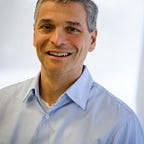Aurora: Powering the Next Revolution in Transportation
Did you know that every minute, 2.4 people lose their lives on the world’s roads?
Or that 6 million individuals with a disability in the U.S. have difficulty accessing the transportation they need?
How about that the average driver spends 80 minutes each day commuting — the equivalent of 14 days a year?
Self-driving technology has the potential to be one of the most impactful technological shifts of our lifetime, alongside computing and the internet. It means safer roads (think about when you’re tired or not able to drive), productivity gains (think about how you could be catching up on email instead of driving), and less traffic.
True Autonomy in this context means that we can ultimately transition transportation to be a full-fledged service — it means that people can have transportation anywhere, anytime, without having to physically own anything.
Self-driving technology is also extremely complex and demands rigorous engineering and innovative machine learning approaches. It is one of the absolute hardest problems to solve. Building self-driving vehicles requires multidisciplinary expertise across computer vision, sensor fusion, mapping, advanced ML, robotics, etc…as well as years of experience to develop the foresight to make the right design choices that will enable the platform to be scalable and extensible.
Clearly, it takes a very special team to take on this challenge.
Enter Aurora.
Aurora was founded by some of the most prominent people in the self-driving car world. Co-founder and CEO Chris Urmson has nearly 20 years of experience developing self-driving and robotics technology. He helped found, lead, and later served as Chief Technology Officer for Google’s Self Driving car project (now named as Waymo); Co-founder and CTO Dr. Drew Bagnell was a former lead engineer for Uber’s Advanced Technology Center and an associate professor at Carnegie Mellon University’s Robotics Institute; and Co-founder and CPO Sterling Anderson is an MIT-trained roboticist who led the design, development, and launch of the award-winning Tesla Model X, then led the team that delivered Tesla Autopilot.
Chris, Drew, Sterling and the world class team they’ve assembled at Aurora have built cars and pioneered robotics and ML techniques. They’ve proven to have the best multi-disciplinary approach and the agility to iterate and evolve far more rapidly than other players. The pace of innovation at Aurora is astounding — they’re moving 2X faster by leveraging advances in engineering.
Despite all the accolades, Chris and team are very humble and realistic about the challenges ahead and are focused on making self-driving a reality. It is for all of these reasons and more that we’re so proud to partner with Chris, Drew, Sterling and team in Aurora’s latest round of financing, alongside our friends at Sequoia, Greylock and Index.
In Chris’ words, “[t]his is about building something that will make the roads dramatically safer, make transportation more accessible and make it better. We’re going to build an incredible business and build something meaningful.” Lightspeed is grateful to be a partner for the journey ahead.
From our investment in Aurora to backing revolutionary rockets, AI-based learning and recognition platforms, robotics, and aerial systems, the next-generation computing which must operate in the physical world is an area we deeply believe in and will continue to invest in.
— Ravi Mhatre & Raviraj Jain, Lightspeed
